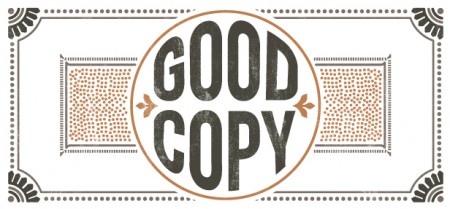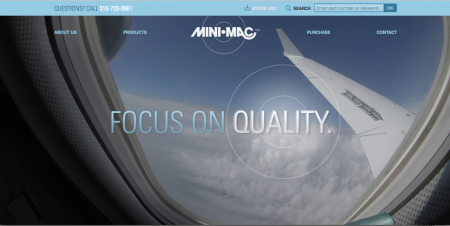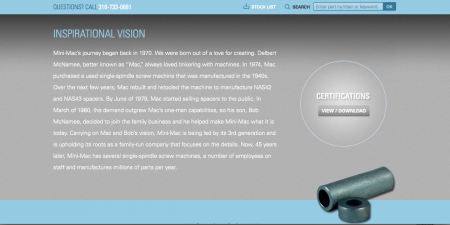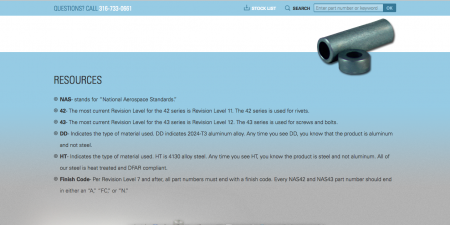
We talked a little bit about bad copy and how it can negatively affect your website or email campaign, but there are plenty of strong examples of copy that can excite readers. Check out some of our favorite examples to see how other companies tell their brand’s story.We love the mysterious package company for their mysteriously cool concept, but we also love the way they put their concept together—through stories. This team understands a good story and they know how to pique our interest.Who doesn’t love mail? And who doesn’t love mail from strangers? That’s the basis of the Mysterious Package Company’s model, but instead of just saying that, they showed it to us by crafting a product story that we can’t resist. Notice how the Mysterious Package Company doesn’t have any jargon or any gimmicks. They tell you what they give you by creating a story out of it. That’s the best possible way to craft copy that will engage and motivate your readers.
It began one evening with a strange letter from a law firm I’d never heard of. Inside, I was informed of the passing of my Great Aunt Hanna – I didn’t even know I had a Great Aunt Hanna – and she had left a note for me. It was handwritten, and contained within a frail, ancient envelope. It was written in longhand, a warning about ghosts, and some coordinates that seem to be from a small island in the South Pacific. There was a map fragment of the island as well, but none of this makes any sense. Our stories begin with The Pledge, often an unexpected letter, and often regarding a relative or other previously unknown person. This is the start of the adventure, a puzzling moment of intrigue that draws the recipient into the scheme. We pay careful attention to all aspects of what we send: the date of the stamps, the style of the postmark, the age of the paper… how everything feels in the hand is as important as what is written on the page.
CatBird, a jewelry company based in Brooklyn, New York, doesn’t have to do much to get their story across. They create a reason that someone would want to buy their products. Instead of just saying, “these are great and will look beautiful in your house,” they create an experience around their items so that you can begin to visualize your life with those items.
Our ethereal, light as a feather Fairy Light Eternity Band, now available with a seductive curve, and in demi pavé, for a subtler shine.
Like CatBird, Dollar Shave Club does a good job of making something boring (razors)…well…exciting. They don’t tell you anything extra that you don’t need to know. They don’t try to string you along with empty promises. They keep a consistent tone that engages their readers.
The era of peaceful shaving is upon us.
Dr. Carver returns shaving to the delightful experience it was meant to be. The exclusive formulas are enriched with gentle botanicals and premium extracts to ensure your satisfaction every step of the way.
Honest Tea understands how to tell a good story. They know that that’s what their customers care about most. Not only the taste of the product, but the why of the product. Why should we care and why does this matter are two of the biggest questions that most customers ask, and Honest Tea addresses both questions right away.
Timing was everything. Barry had just returned from India where he had been analyzing the tea industry for a case study. Among other things, he came away with the impression that the tea many American companies purchased for bottling was the dust and fannings left after whole tea leaves had been brewed. Barry had even come up with a name to describe a bottled tea that was made with real tea leaves–Honest Tea. When Seth heard the name, the simmering idea began to boil–it was the perfect name for an all-natural brand that would strive to create healthy and honest relationships with its customers, suppliers and the environment. Seth took a deep breath, quit his job at Calvert mutual funds, and started brewing batches of tea in his kitchen. Five weeks after taking the plunge, he brought thermoses of tea and a recycled bottle with a mock-up label to Fresh Fields (Whole Foods Market). The buyer ordered 15,000 bottles, and Seth and Barry were in business–if they could figure out how to make that much tea. They did, and we’re still at it 15 years later.
Tuft & Needle, a mattress company, has a great blend of story and mission. They keep their text short and interesting, and they give enough examples to keep their readers interested.
JT had just gotten married and he and his wife set out to buy their first piece of furniture together–a new mattress. The search began at local mattress showrooms; vast fields of mattresses neatly laid out under the buzz of fluorescent lights. Pushy salesmen pushed them to buy a fully loaded, feature-rich memory foam mattress. For $3,300 it should have been the pinnacle of comfort, but it wasn’t. To make matters worse, the return policy rendered it impossible to return. It was like car shopping. Actually it was worse than car shopping. At work the next day, he shared his story with Daehee. The two friends from college had been working together at a company in Palo Alto, and unsurprisingly had similar experiences. There was work to be done. We believe that business can be honest and premium products don’t need remote controls and payment plans. Especially not mattresses.
Warby Parker, a glasses company dedicated to providing an alternative to expensive eyewear, understands that their story is what makes them them. They focus on keywords (like “rebellious” and “lofty,”) and allow their customers to create their own assessment of the brand.
Every idea starts with a problem. Ours was simple: glasses are too expensive. We were students when one of us lost his glasses on a backpacking trip. The cost of replacing them was so high that he spent the first semester of grad school without them, squinting and complaining. (We don’t recommend this.) The rest of us had similar experiences, and we were amazed at how hard it was to find a pair of great frames that didn’t leave our wallets bare. Where were the options? It turns out there was a simple explanation. The eyewear industry is dominated by a single company that has been able to keep prices artificially high while reaping huge profits from consumers who have no other options. We started Warby Parker to create an alternative.





